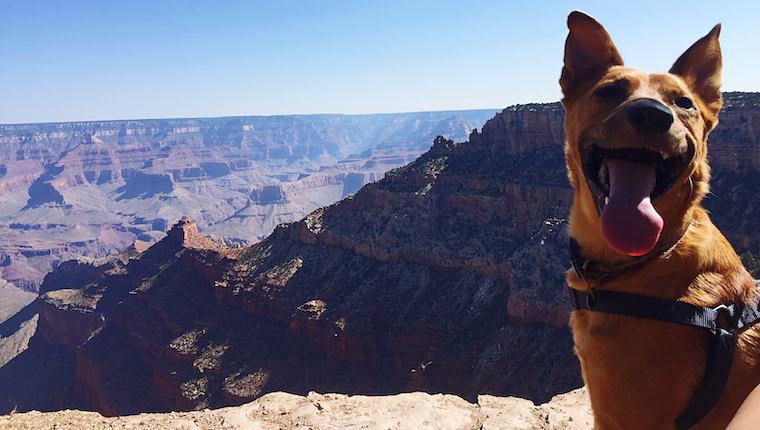What are the dog laws in Arizona? Does Arizona have dog laws? If you live in this state, you might be wondering what the law says about issues like rabies vaccination, dog bites, dog abandonment, or dog cruelty.
Read on for more information about dog laws in Arizona.
Rabies Vaccination Laws
In Arizona, any dog over three months of age must be vaccinated for rabies. A licensed veterinarian must perform vaccinations. Dogs must wear rabies identification at all times to show proof the animal has been vaccinated. After their first vaccine, dogs must be vaccinated the next year. After this second vaccine, they may receive their vaccines on a three-year schedule.
There are no medical exemptions for rabies vaccinations in the state of Arizona. But, a bill may be introduced that allows exemptions based on antibodies found in the pet. While this bill has not yet passed, it would allow qualifying ‘immune’ pets to avoid revaccination.
If an unvaccinated dog bites someone, they are subject to a ten day quarantine. Unfortunately, dogs who display symptoms of rabies during this time will be euthanized for testing. If they do not, they will be returned, but must be subsequently vaccinated.
Failure to vaccinate your dog in the state of Arizona is an infraction.
Dog Bite Laws
Arizona is fairly strict regarding consequences for dog bite incidents. In these cases, the law almost always sides with the person(s) who was attacked. Arizona practices “strict liability” regarding these cases. This means that a dog owner is liable for an aggressive dog even if the attack could not have been prevented or predicted. For example, consider someone visits your house. Your dog has never been previously aggressive, and is contained in a crate. However, your visitor chooses to put their hand in through the bars of the crate, and is bitten. Although precautions were taken, you would still be liable for your dog’s bite.
There are cases where dogs will not be considered aggressors in attacks.
Dog owners are not responsible for attacks in which the dog was provoked or protecting the owner. This could include yelling at, hitting, or throwing objects at the dog. Additionally, if you were trespassing on private property and then were attacked by an otherwise contained dog, the dog’s owner would not be liable.
A dangerous dog, particularly a repeat offender, may be euthanized if this is determined to be in the best interest of the safety of the community. After one documented bite, a dog is considered vicious in the state of Arizona. This means that subsequent bites may lead to euthanasia. Additionally, a severe enough attack could lead the court to determine euthanasia is the best course of action even for a first offender.
Additionally, Arizona requires that witnesses to a dog bite or attack report the incident. This includes bystanders who were not a part of the incident. Of course, this applies in cases of injury. For example, a teething puppy nipping at a hand, not drawing blood, does not require a report.
Dog Abandonment Laws
In Arizona, animal abandonment is prohibited by law. However, the law fails to really define what this constitutes. The law simply states that it is illegal to abandon an animal. There’s few specifics as to scenarios beyond that. Animal abandonment is always dangerous to animals and people that may encounter them. In Arizona, an abandoned pet will have to deal with brutally hot weather as well as wild animals like coyotes. It’s always better to surrender a pet to a shelter or rescue if you cannot keep them.
Dog Cruelty Laws
In Arizona, animal cruelty is most often a misdemeanor. Animal cruelty can have serious consequences. Even first offenders can face jail time and large fines. Consequently, repeat offenders face harsher sentencing. Additionally, convicted animal abusers may lose the ability to legally possess animals for up to ten years. Aggravated animal cruelty carries heavier charges. These charges result in cases where an act of cruelty results in severe suffering, disfigurement, or death of the animal. Aggravated animal cruelty often results in felony charges.
As in the other 49 states, dogfighting is a felony in Arizona. This doesn’t apply only to those directly fighting their animals. It also applies to promoters or spectators of these events. Yes — watching a dogfight is also a felony. In Arizona, knowingly being present at one of these events results in a class 6 felony charge.
Tethering Laws
Arizona does not prohibit tethering dogs. There are some criticisms in regards to Arizona’s blatant lack of tethering laws. Without proper restrictions, tethering can be dangerous to dogs. However, many Arizona counties have taken tethering laws into their own hands. There are many county-specific ordinances. For example, in Phoenix, it’s illegal to tether a dog during inclement weather conditions. This means that, while tethering isn’t illegal in Arizona, it’s a good idea to read up on your local ordinances if you plan to tether. As a rule of thumb, provide tethered dogs with accessible shelter, at least ten feet of clean and maintained space. Additionally never tether to a collar that has potential to choke or strangle the dog.
How Arizona Ranks Against Other States
Arizona ranks as a “middle-tier” state for animal protection laws by the Animal Legal Defense Fund. Out of all 50 states, Arizona comes in at number 26 for animal rights. There are some good things about Alaska’s animal laws. For example, Arizona requires veterinarians to report suspected abuse. But, Arizona still has a lot of room to improve. This state also has many poorly defined laws that leave wiggle room for offenders.










